Many people assume all essential oils are safe for everyone, but individual sensitivities vary, so always dilute and patch test first. Using oils undiluted or overapplying can cause skin irritation or burns. Avoid relying solely on inhalation without proper ventilation, and be cautious around pets and children. Consult professionals for medical issues, consider allergies, and learn proper blending techniques. Continuing your journey will help you avoid these common safety mistakes and use oils confidently.
Key Takeaways
- Relying solely on DIY blends without professional guidance increases risk; always consult experts before use.
- Skipping patch tests and improper dilution can cause skin irritation or allergic reactions; perform tests and follow recommended dilutions.
- Using essential oils undiluted or excessively applies dangerous levels, leading to irritation or toxicity; adhere to recommended amounts.
- Neglecting ventilation during inhalation or improper storage can cause respiratory issues and reduce oil efficacy; diffuse in well-ventilated areas and store properly.
- Ignoring safety around vulnerable populations like children, pets, or those with health conditions increases harm; keep oils out of reach and seek medical advice when needed.
Assuming All Essential Oils Are Safe for Everyone

Many people assume that all essential oils are safe simply because they are natural, but this isn’t true for everyone. This safety misconception can lead to improper use and potential health risks. Essential oils aren’t universally safe; individual sensitivities, allergies, and medical conditions vary. You might hear that essential oils are harmless, but that’s not accurate for every person. Just because an oil is natural doesn’t mean it’s safe for all skin types or internal use. Relying on the idea of universal safety can cause you to overlook important precautions. Always research specific oils, consider your personal health, and consult professionals when in doubt. Recognizing that safety isn’t universal helps you avoid unnecessary harm and use essential oils responsibly. Special Occasions
Using Essential Oils Undiluted on Skin
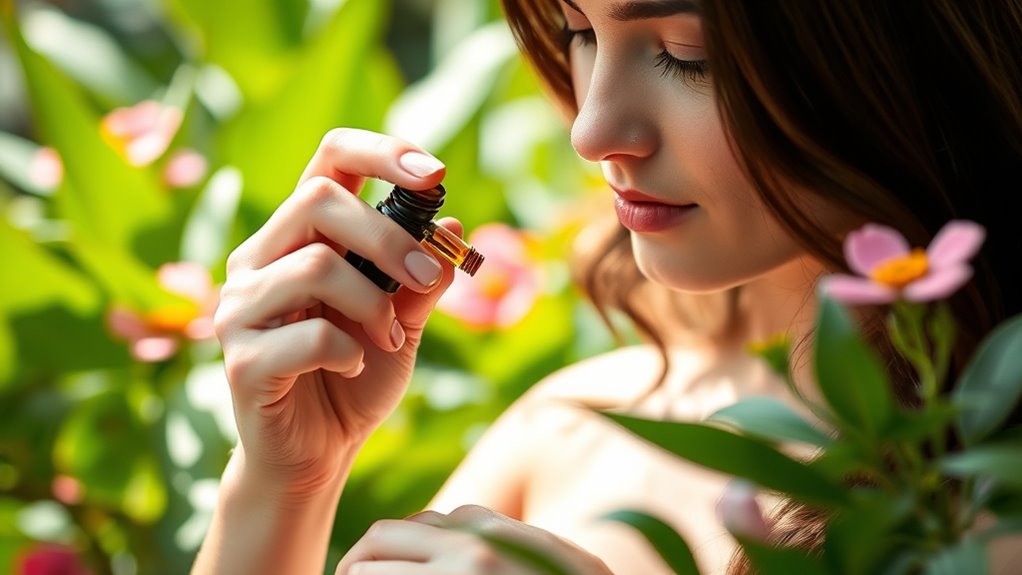
Applying essential oils directly to your skin without dilution can cause irritation, burns, or allergic reactions. To avoid these issues, use proper dilution techniques, such as mixing oils with carrier oils like coconut or jojoba. Always follow recommended dilution ratios—typically, a few drops of essential oil per teaspoon of carrier oil. Before widespread use, perform a skin patch testing by applying a small amount of the diluted oil to a discreet area. This helps identify any adverse reactions and ensures your skin tolerates the oil. Remember, undiluted essential oils are potent and can be harmful if applied directly. Proper dilution and skin patch testing are essential steps to safely enjoy the benefits of essential oils without risking skin irritation or injury. Additionally, understanding AI security vulnerabilities can help in developing safer AI applications that prevent unintended harm.
Neglecting a Patch Test Before Use
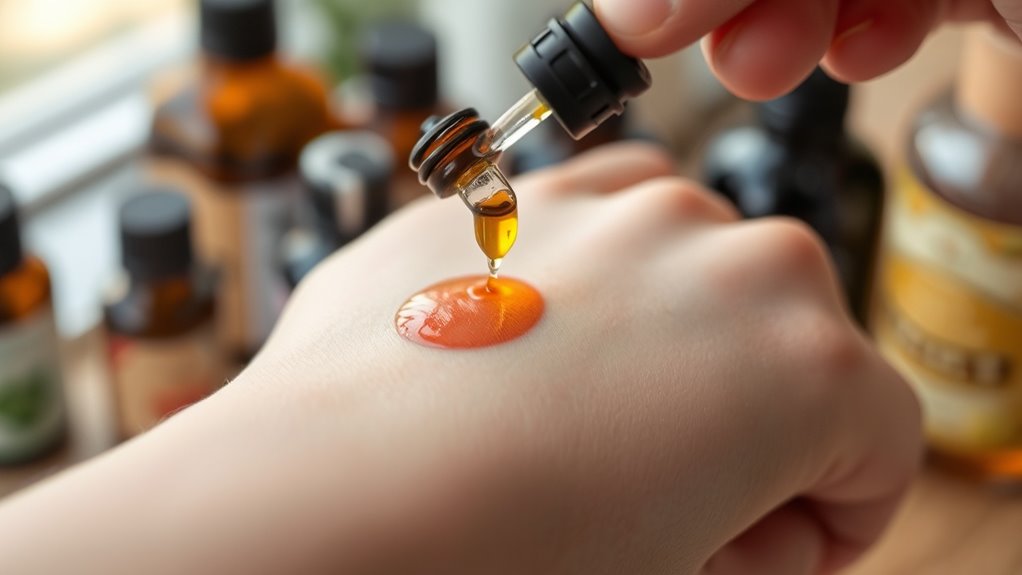
Have you ever skipped a patch test before using a new essential oil? Neglecting this step can lead to unexpected skin reactions or allergic responses. Performing a patch test helps identify sensitivities before widespread application. To do this, apply a small diluted amount of oil to your inner forearm and wait 24 hours. If redness, itching, or swelling occur, avoid using that oil. Here’s a quick guide:
| Step | Action | Result |
|---|---|---|
| 1 | Dilute the essential oil | Reduce risk of reactions |
| 2 | Apply a small patch to skin | Test for sensitivity |
| 3 | Wait 24 hours | Observe for skin reactions |
| 4 | Check for redness or irritation | Detect allergic responses |
| 5 | Decide on safe use | Proceed or avoid use |
Neglecting to perform a patch test increases the risk of skin reactions and allergic responses, so always patch test first.
Overusing or Excessively Applying Essential Oils

While it might be tempting to use more essential oil for faster results, overusing or excessively applying these concentrated substances can do more harm than good. Too much oil can cause skin irritation, sensitization, or toxicity. To avoid this, practice proper dilution techniques and remember that more isn’t necessarily better. When applying, consider oil blending with carrier oils to reduce potency and improve safety. Additionally, understanding creative storytelling for branding can help you communicate the importance of safe essential oil use effectively. Here are some tips to prevent overuse:
Using more essential oil isn’t always better; proper dilution ensures safety and effectiveness.
- Always dilute essential oils before applying to skin.
- Use a drop or two per application rather than heavy amounts.
- Rotate different oils to prevent skin buildup.
- Follow recommended guidelines for each oil.
- Pay attention to your skin’s reaction and adjust accordingly.
Relying Solely on Inhalation Without Proper Ventilation
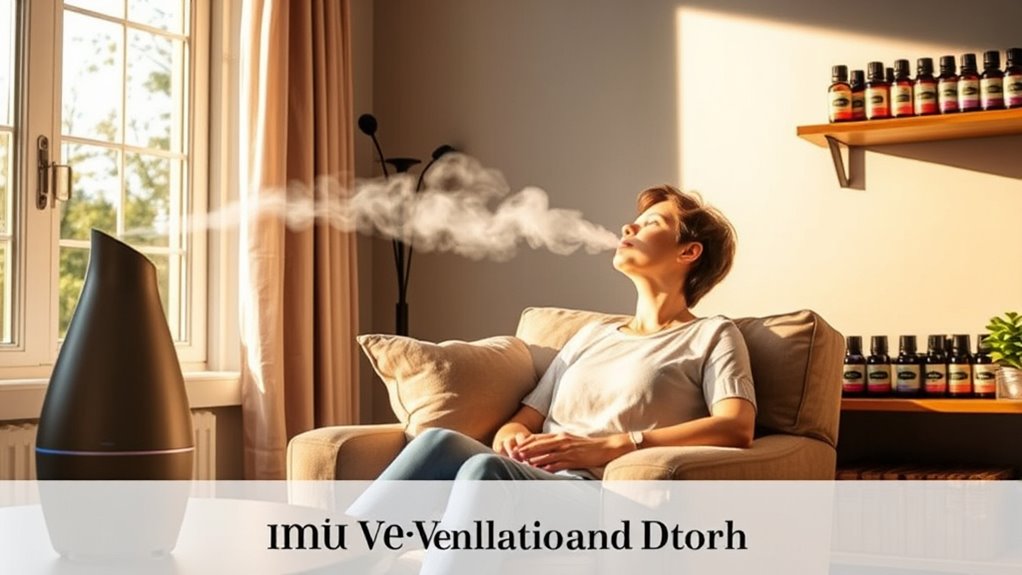
Relying solely on inhalation of essential oils without guaranteeing proper ventilation can lead to health risks. Without adequate airflow, concentrated fumes may cause headaches, nausea, or respiratory irritation. To practice ventilation safety, always open windows or use fans when diffusing essential oils. Proper airflow reduces the buildup of vapors and minimizes inhalation hazards. Keep these inhalation precautions in mind:
| Ventilation Safety | Inhalation Precautions | Best Practices |
|---|---|---|
| Ensure good airflow | Limit diffusion time | Use in well-ventilated areas |
| Use fans or open windows | Avoid prolonged exposure | Never diffuse in small, enclosed spaces |
| Monitor for reactions | Stop if irritation occurs | Diffuse at safe concentrations |
| Regularly air out rooms | Be cautious with sensitive individuals | Practice moderation in diffusing |
Maintaining proper ventilation is also important for protective styling when using essential oils in hair care routines, ensuring safety for both scalp and respiratory health.
Ignoring Storage and Shelf Life Guidelines
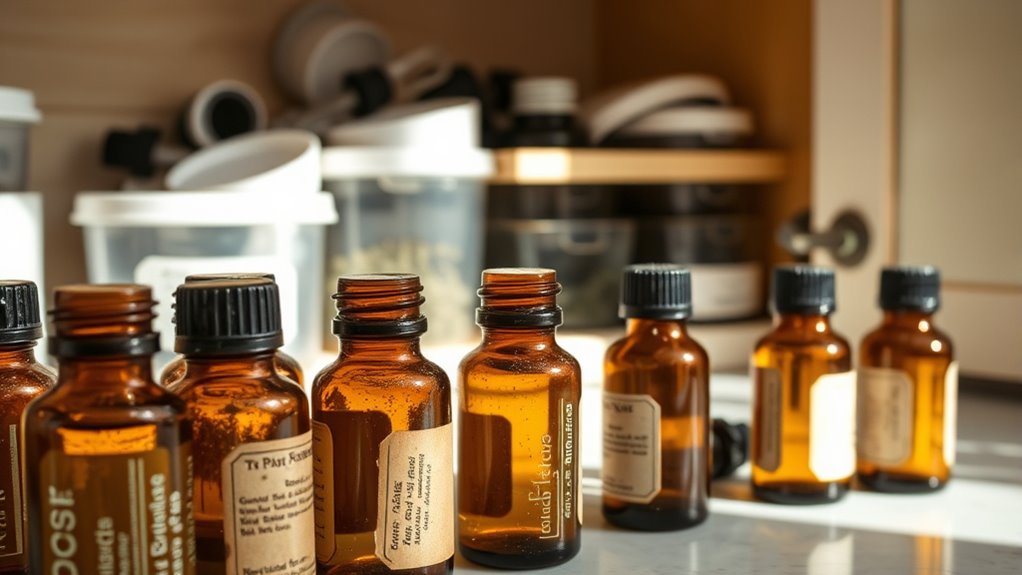
Ignoring storage and shelf life guidelines can substantially reduce the effectiveness of your essential oils and increase safety risks. Proper oil storage preserves their potency, while neglecting shelf life can lead to spoiled or degraded oils. When you don’t follow these guidelines, you risk losing valuable aromatic and therapeutic properties, and potentially using unsafe oils.
Neglecting storage and shelf life harms essential oil quality and safety.
To avoid this, keep these tips in mind:
- Store oils in dark glass bottles away from sunlight
- Keep containers tightly sealed when not in use
- Avoid exposing oils to heat or humidity
- Use oils within their recommended shelf life
- Label bottles with purchase and expiration dates
Taking these simple steps ensures your essential oils stay fresh, effective, and safe for use over time.
Using Essential Oils Near Pets or Children Without Precaution

Storing essential oils properly helps maintain their effectiveness, but using them safely around pets and children requires extra caution. Essential oils can be harmful if ingested or applied improperly, so pet safety and child proofing tips are vital. Always keep oils out of reach of children and pets, preferably in high cabinets or locked drawers. Avoid applying oils directly to children’s skin or near their face unless directed by a professional. For pets, never diffuse oils without thorough research, as some can be toxic. Instead, opt for pet-safe diffusing options or avoid diffusing altogether when animals are present. Being cautious and aware of potential risks helps prevent accidents and keeps your loved ones safe. Remember, a little vigilance goes a long way. Additionally, understanding projector technology can help you create a safe and comfortable viewing environment at home.
Failing to Consult Professionals for Medical Concerns
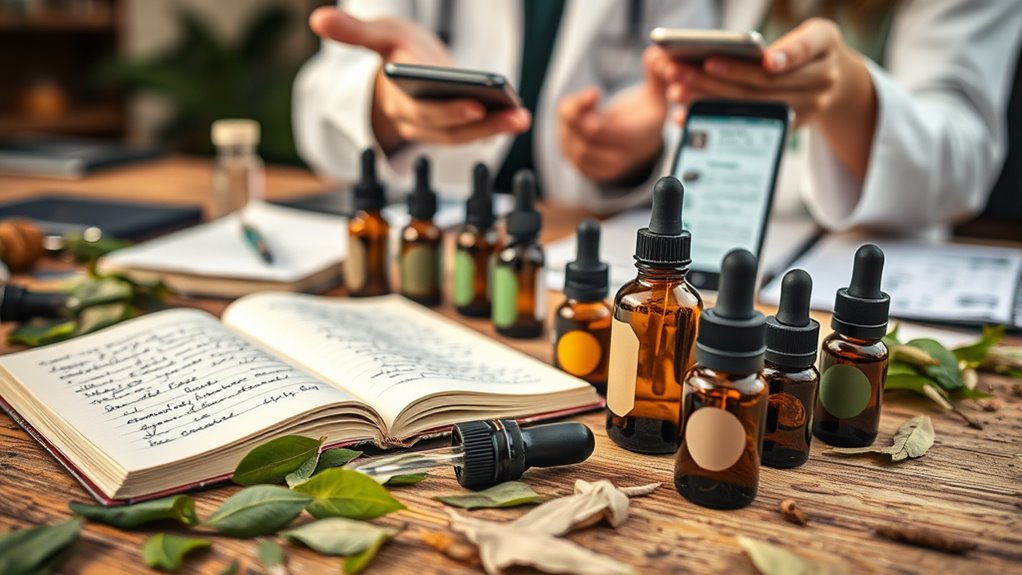
You might think you can handle all health issues on your own, but professional guidance is vital when it comes to essential oils. Ignoring expert advice can lead to unintended side effects or worsening symptoms. Knowing when to seek help ensures your safety and the effectiveness of your treatment. Additionally, understanding aromatic cleaning properties can help prevent misuse and ensure safe application.
Professional Guidance Matters
Even though essential oils are popular for their therapeutic benefits, seeking professional guidance is crucial when dealing with medical concerns. Relying solely on DIY blends or aromatherapy practices without expert advice can be risky. Professionals can help you identify safe options and prevent adverse reactions. Additionally, understanding the best essential oil safety practices can significantly reduce the risk of misuse. Remember these points: – Consult a healthcare provider before using essential oils for medical issues – Avoid self-diagnosing or treating serious conditions with DIY blends – Follow expert guidance on dilution and application methods – Be aware that some oils may interact with medications – Use professional advice to tailor aromatherapy practices safely Ignoring professional input can lead to ineffective or harmful outcomes. Always prioritize expert advice to ensure safe and beneficial use of essential oils for health concerns.
Know When to Seek Help
Ignoring signs of worsening symptoms or underlying health issues can lead to serious complications, especially when relying solely on DIY essential oil remedies. Recognizing symptoms early is vital—if you notice difficulty breathing, swelling, or severe skin reactions, don’t delay seeking professional help. Knowing when to seek help involves understanding symptom recognition and acting swiftly. Emergency procedures should be followed if symptoms escalate or if you experience signs of poisoning or an allergic reaction. Trust your instincts; if something doesn’t feel right, contact a healthcare provider immediately. Essential oils are powerful, and not all reactions are manageable at home. Prioritize your health by consulting professionals when necessary and following emergency procedures to prevent complications. Your safety always comes first. Developing attention in your practice can help you better recognize early warning signs and respond promptly.
Not Considering Potential Allergies or Sensitivities

Many people overlook the possibility that essential oils can trigger allergic reactions or sensitivities, which can lead to uncomfortable or even dangerous symptoms. Prioritizing allergy awareness and conducting sensitivity screening before use is vital. Without this, you risk skin irritation, respiratory issues, or worse. To stay safe, consider these steps:
- Perform a patch test on a small skin area before full application
- Research each oil’s potential allergens
- Be cautious if you have known allergies to plants or fragrances
- Start with diluted oils to minimize reactions
- Watch for any signs of sensitivity during initial use
- Be aware that paint sprayer technology can influence the dispersal of airborne particles, which may affect respiratory sensitivities in sensitive individuals.
Mixing Multiple Oils Without Proper Knowledge
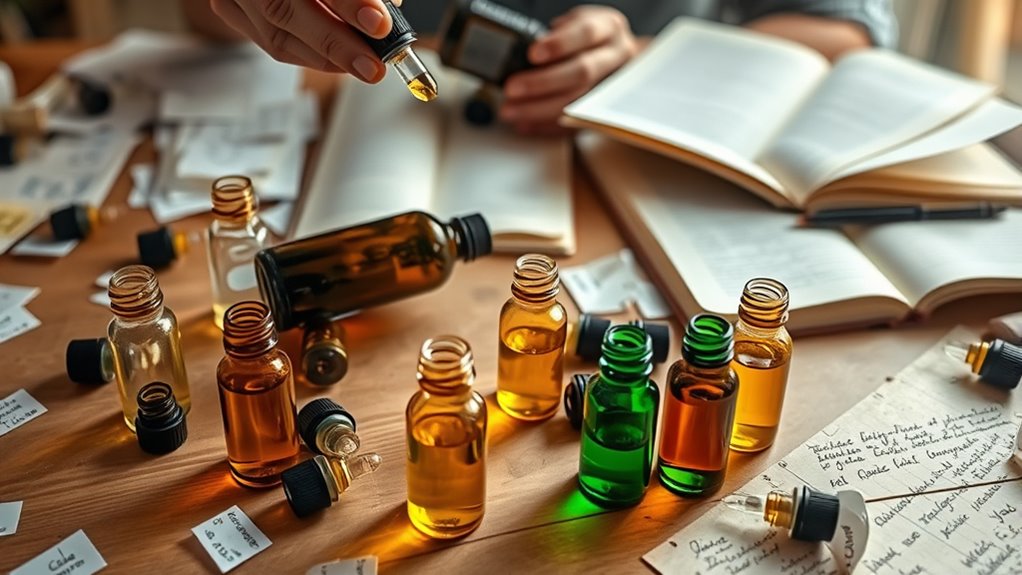
Mixing multiple essential oils without proper knowledge can lead to unpredictable reactions and reduced safety. You might think blending techniques are straightforward, but without understanding oil compatibility, you risk adverse effects. Some oils can cause skin irritation or neutralize each other’s benefits. To avoid this, learn which oils work well together and how to blend them safely. Here’s a quick guide:
| Oil Types | Compatibility |
|---|---|
| Citrus & Mint | Generally safe, uplifting |
| Floral & Woody | Usually compatible, soothing |
| Eucalyptus & Tea Tree | Antimicrobial, but strong |
Always research each oil’s properties and test small amounts first. Proper knowledge of blending techniques and oil compatibility helps you create safe, effective mixes.
Frequently Asked Questions
Are All Essential Oils Safe for Children and Pregnant Women?
Not all essential oils are safe for children and pregnant women. You should always prioritize child safety and pregnancy precautions by consulting a healthcare professional before use. Some oils can cause irritation or adverse reactions, so it’s vital to dilute them properly and avoid certain oils altogether. Always research each oil thoroughly and follow recommended guidelines to guarantee safety for both your child and your pregnancy.
Can Essential Oils Cause Long-Term Health Issues?
While essential oils offer many benefits, long-term effects from chronic exposure can pose health risks. You might not notice immediate issues, but over time, repeated use could lead to sensitivities or other health concerns. To protect yourself, limit exposure, dilute oils properly, and avoid using them excessively. Staying informed helps you enjoy their benefits safely, preventing potential long-term health issues linked to chronic exposure.
What Are Signs of an Essential Oil Allergy?
If you’re allergic to essential oils, you might notice skin reactions like redness, itching, or hives. Respiratory symptoms such as sneezing, coughing, or difficulty breathing can also occur. Pay attention to any unusual symptoms after use, and stop applying the oil immediately. It’s important to consult a healthcare professional if you experience these signs, especially if symptoms worsen or affect your breathing. Always patch-test new oils first.
How Do I Choose the Right Carrier Oil for Dilution?
Choosing the right carrier oil for dilution is like finding the perfect base for a painting; it sets the tone. Focus on carrier oil selection by considering skin type and scent. For sensitive skin, try jojoba or almond oil. Use proper dilution ratios—generally 1-2% for topical use—to avoid irritation. This way, you guarantee your essential oils are safe and effective, just like a well-balanced masterpiece.
Are There Essential Oils That Should Never Be Ingested?
You should never ingest certain essential oils due to internal safety and ingestion risks. Oils like wintergreen, eucalyptus, and rosemary contain compounds that can be toxic if swallowed, even in small amounts. Always consult a knowledgeable aromatherapist or healthcare professional before considering ingestion. Remember, not all essential oils are safe internally; misuse can lead to serious health issues, so prioritize safety and proper guidance.
Conclusion
By avoiding these common mistakes, you can enjoy the benefits of essential oils safely. For example, Jane skipped a patch test and experienced skin irritation. If you take a moment to research, dilute properly, and consult professionals when needed, you’ll protect yourself and loved ones. Remember, responsible use transforms essential oils from a hazard into a helpful, enjoyable part of your wellness routine. Stay informed and always prioritize safety!









